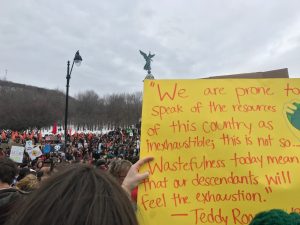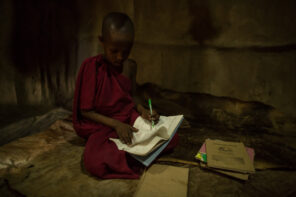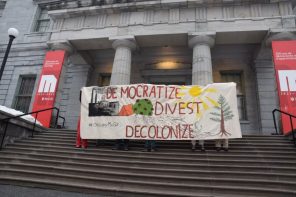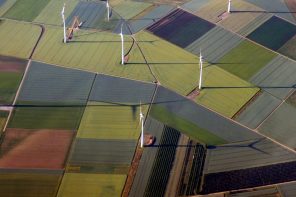Tens of thousands of student protesters took to the streets of Montreal this Friday March 15, calling on their governments and universities to take tougher action against climate change. Among this group was a large faction of McGill students, many of whom had already been mobilizing on campus against lax environmental policies in groups like Divest McGill.
Inspired by Swedish student activist Greta Thunberg, the walkout was one of hundreds across the globe. McGill students were joined by their counterparts from Concordia, UdeM, UQAM, various CEGEPs, and many other Montreal universities and high schools. Greenpeace estimates the total amount of protesters in Quebec at over 150,000.
“The only rational thing we can [do is take] to the streets,” McGill student and activist Jacqueline Lee-Tam insisted during her speech at the rally. “They call us radical, but what’s radical is being complacent in the climate crisis.”
They call us radical, but what’s radical is being complacent in the climate crisis.
The rally began at noon at the foot of the Arts building, where walkout organizers laid out various demands: the establishment of educational programs about the environmental crisis, university divestment from fossil fuel industries, compliance with the targets outlined in the Intergovernmental Panel on Climate Change (IPCC) limiting global warming by drastically reducing global carbon dioxide emissions, and respect for the United Nations Declaration on the Rights of Indigenous Peoples (UNDRIP).
Advocating a complete “system change,” Lee-Tam criticized Prime Minister Justin Trudeau’s proposed carbon tax on greenhouse gas emissions, calling it the “bare minimum.”
“Inequalities are more stark than ever before… We know that a carbon tax is not going to solve the problems of colonialism and capitalism,” she asserted. “When we’re talking about a Green New Deal… what we’re calling for is massive social reform.”
Many students decide to advocate for climate action as a result of “[losing] faith in our administration to act according to what they preach,” according to McGill student Alison Gu, one of the protest organizers. Gu believes that the protest will “get students involved in climate justice for the long haul. We need absolutely all hands on deck [and] massive public mobilization to even have a chance at staying under 1.5 degrees of warming.”
Various speakers outlined the disproportionate consequences of climate change on impoverished regions in the Global South, as well as indigenous peoples and migrants in the Global North. Among these was Indigenous Health Professions Program (IHPP) Outreach Administrator Alex Allard-Gray, a member of the Listuguj Mi’gmaq First Nation, who outlined various incidents of land restriction and police militarization against indigenous people.
“This has been an ongoing issue for as long as I can remember, “ Allard-Gray said, asking, “Why is it always on the backs of indigenous people when we talk about progress and the need to tap into resources? Why is it always falling [on] indigenous people to feel the burden of the heaviest, but also to fight not only for their own survival, but the survival of everyone else?”
Why is it always on the backs of indigenous people when we talk about progress and the need to tap into resources?
Escorted through the streets by police forces, the protestors marched from the McGill campus down Sherbrooke, eventually gathering together with the entire city-wide march in Jeanne Mance Park. The group then travelled down St. Laurent and St. Catherine and eventually convened at Place des Arts. As stipulated by its organizers, the protest remained nonviolent.
“We all know that older generations aren’t doing enough to fight climate change, so it’s up to us. It’s super inspiring to see ours and younger generations come forward,” said U1 student Élise Desbarats, who attended the walkout. “We have a responsibility to use our voices, but also to not speak over the voices of marginalized communities fighting for climate justice.”
U1 student Aylish Marshall agreed. “We’re privileged enough to be able to go to university, so we should use that privilege.”
Many protestors cited the health of future generations as their main reason for taking action. U1 student Jonah Border called climate change “literally the greatest threat humanity has ever faced,” adding, “It’s likely that millions of people are going to die in the coming fifty years or so, and anything that I can personally do to fight against that is definitely a good thing to do.”
Early in the day, Allard-Gray explained a Mi’gmaq philosophy called the Seven Generation principle. According to him, this means that “where we are today as people is because of the actions, thoughts, and sacrifices of seven generations behind us, and what we do today is going to be felt seven generations in front of us.”
“It is becoming increasingly difficult to continue our traditions in the cultural genocide that is essentially ongoing in this country,” Allard-Gray added. “I’m happy that our allies and non-indigenous brothers and sisters have come out today to stand up for our climate and the environment.”









